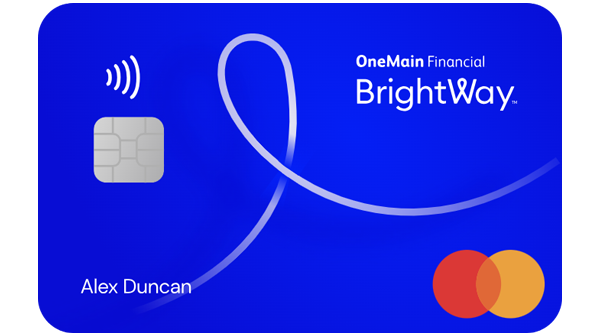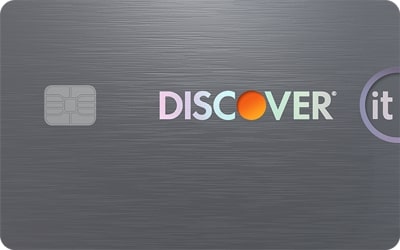OneMain Financial BrightWay Card: Incentives for Healthy Habits
The Bottom Line
3.7
It’s not yet widely available, but for those who are able to apply for the card, it’s a solid option for building credit.


Rates, fees and offers
Rates, fees and offers
Annual fee
$0-$89*
Rewards rate
1%
Bonus offer
None
Intro APR
N/A
Ongoing APR
APR: 35.99%
Cash Advance APR: 35.99%
Balance transfer fee
When available, either $10 or 3% of the amount of each balance transfer, whichever is greater.
Foreign transaction fee
1% of transaction value*
More details from OneMain Financial
More details from OneMain Financial
- See if you're pre-approved with no impact to your credit score.
- Qualify for rewards like a credit limit increase (subject to credit approval) or APR decrease in as little as six months.
- Earn unlimited 1% cash back on purchases.
- Building your credit? We report to the major credit bureaus and good payment habits can pay off.
- Easily manage your account and make payments using BrightWay App.
- BrightWay cards are issued by WebBank.
Pros and Cons
Pros
Accessible with less-than-ideal credit
Reports to all major credit bureaus
Rewards
Cons
Possible annual fee
No upgrade path
Detailed Review
The OneMain Financial BrightWay® Card, issued by WebBank, is an unsecured credit card designed for those with less-than-ideal credit, and it has some solid features.
The annual fee can range from $0-$89*, but there are no monthly maintenance fees. Plus, the card earns rewards and, more importantly, reports to all three major U.S. credit bureaus. With responsible use, it's also possible to get a credit limit increase or an interest rate reduction.
At the moment, though, the BrightWay card is available by invitation only or through certain partner websites. If you want to build credit now, other cards may be more readily accessible.
OneMain Financial BrightWay® Card: Basics
Card type: Credit builder; bad credit.
Annual fee: $0-$89*.
Sign-up bonus: None.
Rewards:
Earn an unlimited 1% cash back on all purchases.
APR: The ongoing APR is 35.99%.
Foreign transaction fee: 1% of transaction value*.
Other benefits:
After making six qualifying consecutive payments, cardholders may choose from one of two "Milestone Benefits": a lower purchase APR or higher credit limit.
OneMain Financial BrightWay® Card vs. OneMain Financial BrightWay+ Card
There are actually multiple BrightWay credit cards, including the OneMain Financial BrightWay® Card and the OneMain Financial BrightWay+ Card. Applicants may choose which version they apply for.
BrightWay card. For those building or rebuilding credit. Annual fee: $0-$89*.
BrightWay+ card. For those with more established credit. Annual fee: $0.
Both BrightWay cards earn 1% back on purchases and have a credit limit of $300 up to $2,000.
Compare to Other Cards

Benefits and Perks
Incentives for healthy credit habits
BrightWay cardholders can earn a reward after achieving a "Milestone Event.” That happens when a cardholder has made six consecutive qualifying payments, which OneMain defines as making at least the minimum payment by the due date.
At that time, eligible cardholders can choose one of two Milestone Benefits: a lower purchase APR or a higher credit limit. Note that the APR cannot be reduced below 19.99%, and the credit limit cannot exceed $15,000.
Cardholders forfeit their Milestone Benefit if they don’t select one by the payment due date following the billing cycle in which the Milestone Event was earned.
After cashing in on a Milestone Benefit, the number of qualifying payments resets to zero, and you can begin working toward another Milestone.
Rewards
The OneMain Financial BrightWay® Card earns an unlimited 1% cash back on all purchases. Cash back is automatically redeemed for a statement credit at the end of each billing cycle.
Among credit cards for poor credit, those are solid rewards.
Low foreign transaction fee
The foreign transaction fee on the BrightWay card is 1%, which is lower than the 3% fee that other non-travel credit cards charge. Plus, as a Mastercard, the OneMain Financial BrightWay® Card will be widely accepted around the globe.
That makes it a decent product for overseas purchases.
Drawbacks and Considerations
Possible annual fee
Depending on your credit history when you apply for a BrightWay card, you may end up with a version that has an annual fee. But even with bad credit, you can get a credit card with no annual fee. Consider the Current Build Card. Not only is its annual fee $0 (see terms), it doesn’t charge interest or require a security deposit.
No upgrade path
Applicants who applied for a BrightWay card before Oct. 31, 2024, may be able to upgrade to the BrightWay+ credit card if they meet certain criteria, but that’s not an option for new holders.
If you fall into that latter camp, it means there's no higher-tier product from the issuer that you can move to when you're ready. Instead, you'd have to apply for a new card from a different issuer and, if your BrightWay card has an annual fee, you'd have to decide whether to keep paying it or close the account.
Applying for new credit accounts and shuttering existing ones can lower the credit scores you just worked so hard to improve.
How To Decide If It's Right For You
According to the BrightWay website, there are only a “limited number of [BrightWay] cards right now.” So for now, for many people, the OneMain Financial BrightWay® Card won’t be an option.
However, if you are able to apply for a BrightWay card, it’s worth considering, especially if you're trying to build or rebuild credit. Just remember that some versions of the BrightWay card have an annual fee, which is an avoidable expense even for those with bad or no credit.
Minimal fees plus a clear upgrade path
The Discover it® Secured Credit Card is a rewards-earning card for beginners that offers potential upgrades starting at seven months. You'll have to put down a security deposit, but the annual fee is $0, and you can get the deposit back once you upgrade to a traditional unsecured card.
Looking For Something Else?
Methodology
NerdWallet reviews credit cards with an eye toward both the quantitative and qualitative features of a card. Quantitative features are those that boil down to dollars and cents, such as fees, interest rates, rewards (including earning rates and redemption values) and the cash value of benefits and perks. Qualitative factors are those that affect how easy or difficult it is for a typical cardholder to get good value from the card. They include such things as the ease of application, simplicity of the rewards structure, the likelihood of using certain features, and whether a card is well-suited to everyday use or is best reserved for specific purchases. Our star ratings serve as a general gauge of how each card compares with others in its class, but star ratings are intended to be just one consideration when a consumer is choosing a credit card. Learn how NerdWallet rates credit cards.
About the author

Jae Bratton
Lead Writer & Content Strategist

